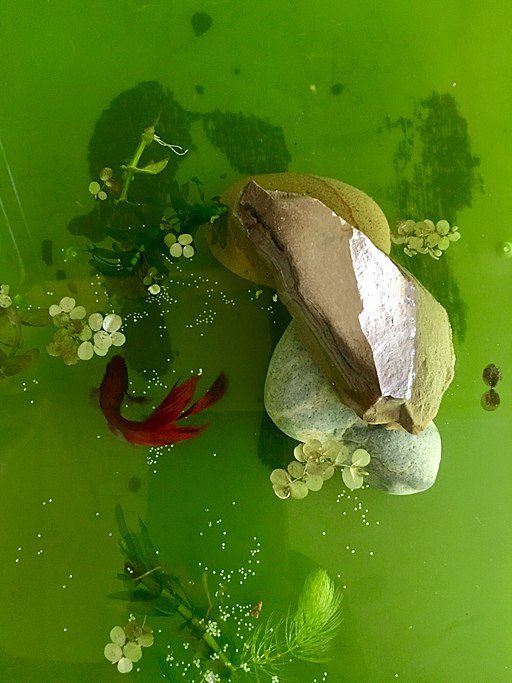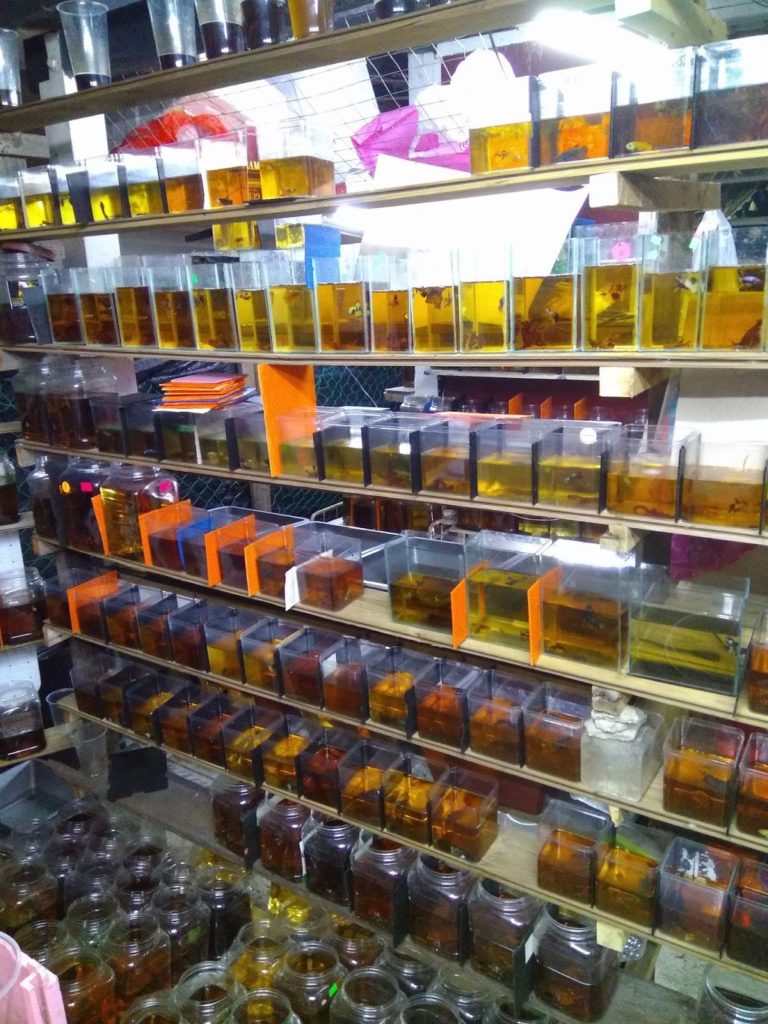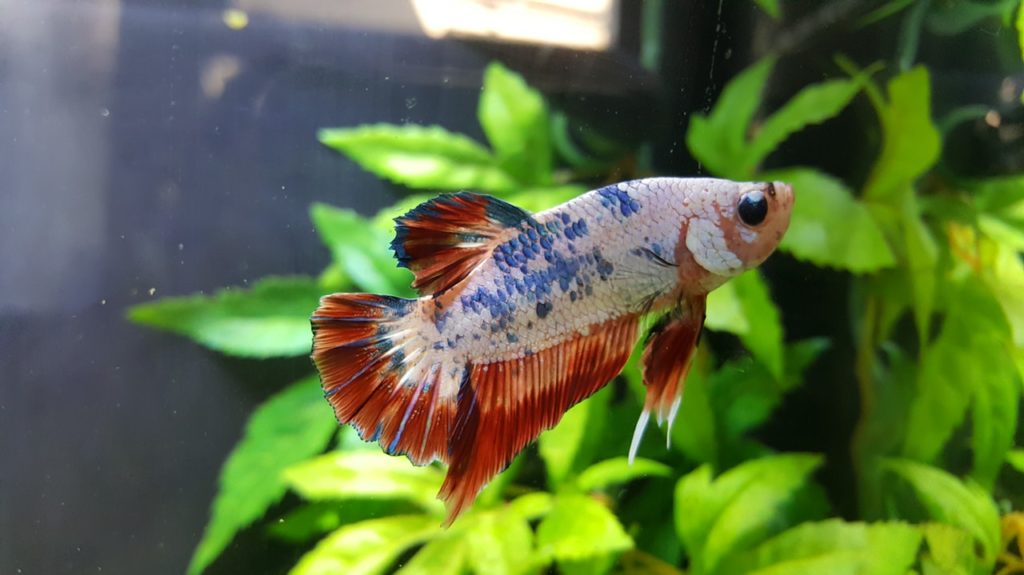Does A Betta Need A Filter
BuildYourAquarium.com is supported past our readers. When you buy through links on our site, nosotros may earn a commission. Acquire more.
Bettas (Betta splendens) are one of the virtually popular fish in the aquarium hobby, for reasons both good and bad.
The proficient is that they are tolerant of a wide range of h2o chemistries and temperatures and don't need much space to live in.
The bad thing is that this makes people assume they actually adopt living in such environments.
Well-meaning and only greedy aquarium shop owners ofttimes perpetuate the half-truth that Bettas prefer modest pools of foul water and are perfect for folks looking for a upkeep fish option!
Common Question of the Mean solar day: Do Betta Fish Need a Filter?
This is one of the near common questions amidst new betta fish owners – let's wait into our answer.
Answer: Betta Fish Admittedly Demand a Filter!
Filtration is incredibly important. Non just do filters pull out suspended matter from the water column; they as well create surface area for beneficial bacteria to colonize.
These bacteria take ammonia and brainstorm the conversion to nitrite and eventually nitrate, the least lethal form. In a tank with no biological activeness, ammonia simply collects over time, pickling fish in their own waste.
Yeah, you could survive smelling your own urine constantly – but would you want to?
It's pretty barbarous to subject any animal to the blank essentials of survival, specially when small sponge filter units can be had for less than $10.
We recommend the sponge filter seen below.
Merely What About those Bowls with Plants?
"Betta bowls" have risen in popularity in recent years. People are sold on the idea of fish eating the roots while the plants pull out waste product and oxygenate the h2o, like to an enclosed biosphere.
While attractive, the idea is, unfortunately, entirely flawed and is purely a sales gimmick.
Kickoff, Bettas don't eat plants. They are carnivorous in nature, eating mosquito larvae, daphnia, worms, and other small creatures easily plant in the deadening-moving waters of Southeast Asia.
While they'll happily eat flakes and pellets, they aren't plant eaters. They may crumb on plant roots in an exploratory manner; fish don't have hands, after all. But they aren't getting whatsoever nutrition from roots.
On the other hand, the plants do get a fair amount out of the exchange.
Betta basin plants include bamboo species, spider lilies, and other plants whose roots can withstand total immersion. The abiding h2o plus the heady period of organics from fish waste matter and your food additions makes for excellent fertilizer.
Near all plants release oxygen from their stomata, which are tiny orifices located on the leaves and stems of plants. Not on the roots. In fact, constitute roots are actually consumers of oxygen.
Plants uptake oxygen through the roots for metabolic purposes; terrestrial plants decrease the amount of oxygen in the h2o for your Betta.

Don't Betta Fish Exhale Air and Prefer Muddy Ponds?
Sort of! Anyone who watches a Betta for more a few minutes will see them take a gasp of fresh air from the surface.
Thanks to their labyrinth organ, they can use atmospheric air to supplement the oxygen they obtain from the water.
This evolutionary characteristic allow Bettas and their relatives (gouramis and paradise fish) to thrive in brackish, low-oxygen environments like slow flowing creeks, rice paddies, and the shallows of steamy, sluggish tropical rivers.
These environments are also ideal for the insect larvae they love to eat! Merely just considering they can tolerate polluted, stale h2o doesn't mean you should give that to them.
Betta appreciate filtration and 0ppm ammonia and nitrite, same as any other fish. In nature, the sheer volume of any body of water plus biological breakup via plants and microorganisms helps minimize pollution.
Fifty-fifty a neglected rice paddy will test amend for ammonia than your Betta bowl.
Okay, But I See Bettas in Fish Bowls Even at the Pet Stores!
Cramped for space as pet stores are, information technology makes sense for them to stock a wall with bowls. Betta bowls are piece of cake to make clean, inexpensive to stock, and are a great manner to keep groups of males close nevertheless split.

Every bit y'all already know, bettas are incredibly aggressive towards each other.
Fun fact: wild Betta males are combative but aren't murderous.
If you ever observe wild bettas, of which there are several dissimilar species, y'all can continue multiple males in tanks large enough to give them space to flee.
Shop bought Bettas are the descendents of Thai Siamese Fighting Fish, which accept been bred for centuries for color, showy fins like a matador's cape…and accented aggression.
So bowls do make sense since they'd rip each other apart in an aquarium and they have their labyrinth organs to have in fresh air as needed.
From there, it'south an easy step to sell them to people looking for a cheap, showy fish that seemingly doesn't need a filter…or aquarium, ane might recall.

How Much Infinite Should I Requite a Betta?
Bigger is always amend when trying to decide how much space to give any fish.
I always tell people to get the largest tank they tin can afford and have infinite for. The larger the tank, the more stability the environment affords.
It's better insulated confronting temperature extremes, water chemical science shifts, and volition allow for greater biological activity.
Only if you really want a hard minimum, I wouldn't but a tank (or bowl) below v gallons in size. 10 is better, of course.
And don't forget a filter; even a simple sponge filter is better than goose egg.
Annihilation Else?
Don't keep animals just to give them the bare bones basics.
Give them an enriching environs. Peaceful tankmates like neon tetras and platies add together stimulation. Floating plants add shade and security as well every bit anchors for chimera nests. Submerged plants give them perches to rest on and places to explore. Live and frozen nutrient like bloodworms and brine shrimp add variety and also promote better color. A filter ensures optimal water quality.
And all of these things make your Betta aquarium fifty-fifty more fun for yous to picket! Everyone wins.
Conclusion
Do Betta fish need a filter? The answer is a resounding "Yes!"
The type of filter depends on your tank or basin size besides equally the number of inhabitants and how often yous feed. Some of the nearly incredible Betta aquariums I've seen are actually "filter-less!"
They use established jungles of aquatic plants to provide all filtration; and unlike spider lilies, they do a good task of it! I'd expect into these if you're interested in a truthful "biodome" sort of aquarium.
While more than challenging, it's an achievement that will take your Bettas in glowing health!
Does A Betta Need A Filter,
Source: https://www.buildyouraquarium.com/do-betta-fish-need-a-filter/
Posted by: browncritheing.blogspot.com



0 Response to "Does A Betta Need A Filter"
Post a Comment